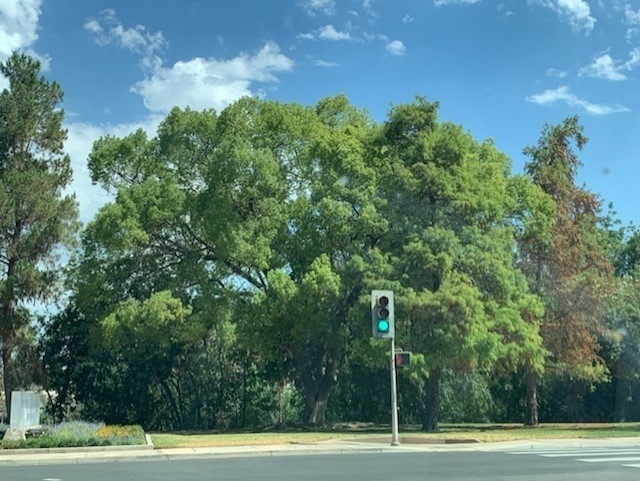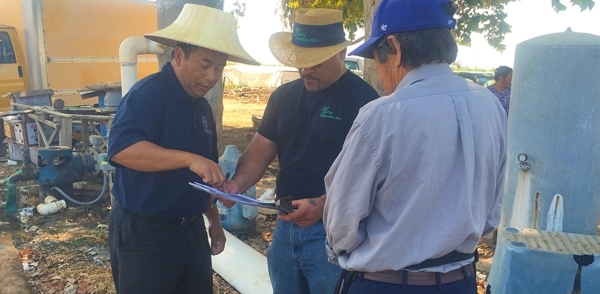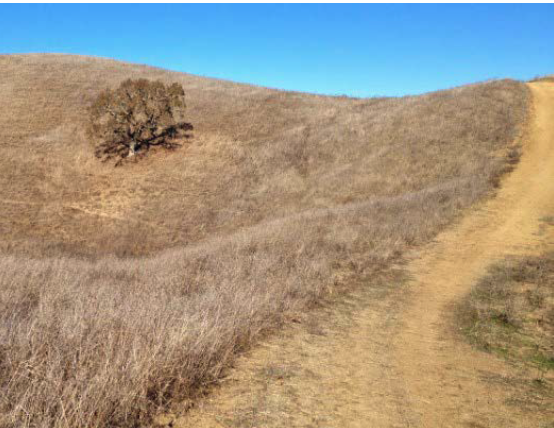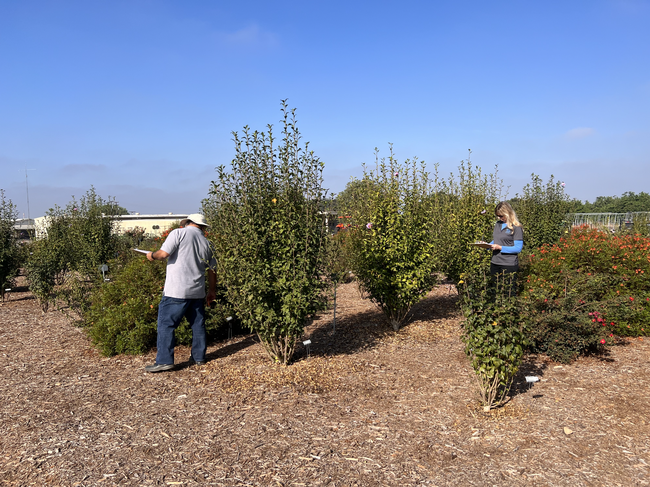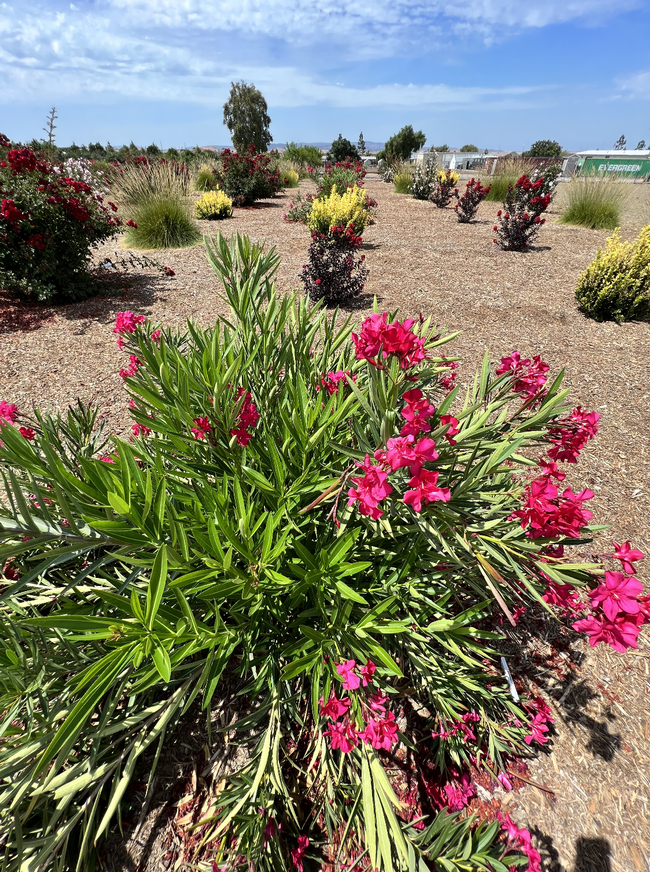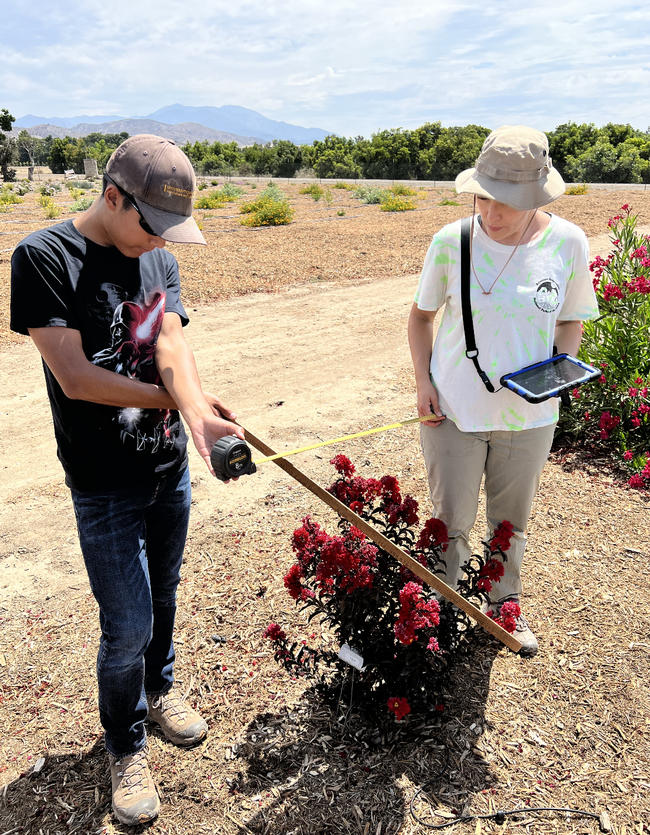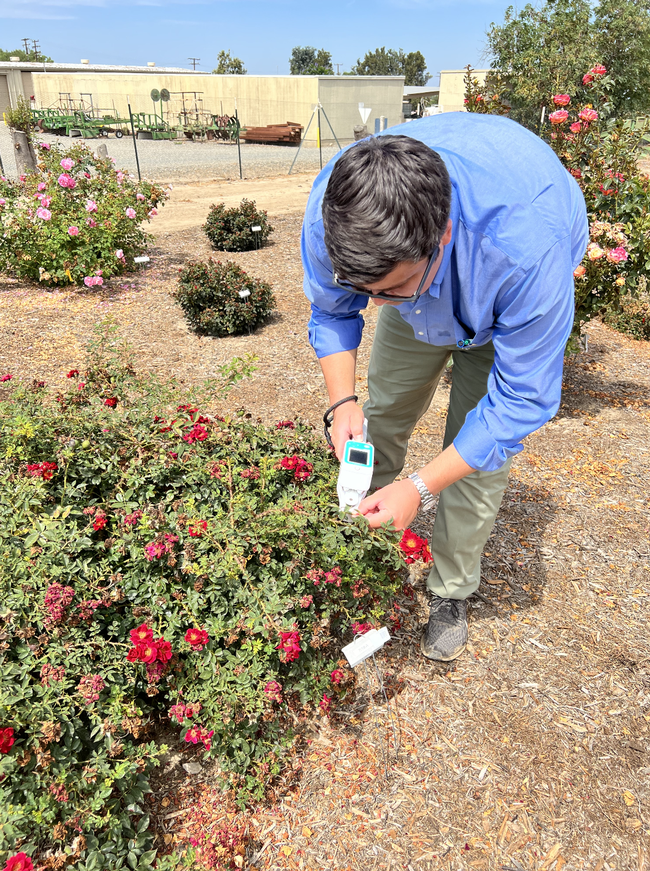Posts Tagged: Domena Agyeman
Lawn-pocalypse! Surviving Drought
Ah, summer! The season of sunburns, pool parties, and… lawn droughts. If your once lush, green carpet now looks like a crunchy brown doormat, you're not alone. Let's dive into why your yard is staging a dramatic death scene and what you can do to...

Bermuda grass and weeds overtaking drought stressed turf grass.
UC ANR adds 9 experts in water, wildfire, pest management and more
To help more Californians address challenging issues, University of California Agriculture and Natural Resources has hired UC Cooperative Extension experts to work in communities stretching from Humboldt and Siskiyou counties in the north, and south to San Diego County. State funding has enabled UC ANR to expand its expertise.
Since 1914, UC Cooperative Extension's researchers have been working directly with community members to improve the lives and livelihoods of Californians.
The nine recently hired UC Cooperative Extension specialists and advisors bring expertise in forestry, pest management, water, plant disease, horticulture, toxicology, economics, rice farming and wildfire.
To see a list of UC Cooperative Extension advisors who have joined in the past few months, visit https://ucanr.edu/About/DirectorySearch/Recent_Hires. The most recently hired scientists are introduced below.
Gill joins UCCE as environmental horticulture advisor
Haramrit Gill joined UC Cooperative Extension on April 1 as an environmental horticulture advisor for Tulare, Kings, Fresno and Madera counties.
She will be identifying landscape plants that are heat-tolerant, disease-resistant and fire-resistant. Gill will be researching California native plants with sustainable attributes that include superior adaptation, biodiversity enhancement, water efficiency and soil health benefits.
A native of Punjab, India, Gill earned her undergraduate degree in agriculture followed by a master's degree in horticulture at Punjab Agricultural University, where her research focused on micropropagation and haploid production in muskmelons. She earned a Ph.D. from the Department of Horticultural Sciences at Texas A&M University.
Her early research investigated the impact of nitrogen on spinach root architecture. Her doctoral work concentrated on rose breeding and deciphering the genetic underpinnings of flower color transition traits, fragrance and dwarfing in roses, with a particular focus on the intriguing phenomenon of flower color transformation from yellow to dark pink as blooms matured. She also collaborated on projects aimed at enhancing heat tolerance and disease resistance in roses.
Gill is based at the UCCE office in Tulare and can be reached at hamgill@ucanr.edu.
Jordan joins UCCE as forestry and natural resources advisor
Christian Jordan joined UCCE on March 18 as a forestry and natural resources advisor for Shasta, Siskiyou and Trinity counties. He will work to advance forest resilience and sustainable management on private and public lands, with a focus on conifer forest resource management and sustainable natural resources.
In 2020, Jordan completed a Master of Forestry at UC Berkeley, with an emphasis on forest resilience in the context of increasingly severe wildfires. Prior to joining UC ANR, he worked in the private sector in defensible space and home hardening, installing residential exterior sprinkler systems for ember defense.
Jordan brings a diverse educational and work background to the position. In 2014, he earned a bachelor's degree in geography from UC Berkeley, writing a thesis on future climate and viticulture in Napa and Sonoma counties. Upon graduating, he worked in the wine industry before returning to natural resources.
Jordan is based at the UCCE office in Redding and can be reached at cjordan@ucanr.edu.
Pastrana joins UCCE as plant pathology advisor
Ana Pastrana joined UCCE on Jan. 16 as a plant pathology advisor serving Imperial, Riverside and San Diego counties.
In her role, Pastrana will collaborate with pest control advisers and support growers with disease management. In addition to identifying high priority concerns, she will conduct research and develop educational content that addresses growers needs.
Before moving to Southern California, Pastrana worked as a research scientist on plant pathology at the University of Seville, Spain, and at Vineland Research and Innovation Center in Canada. Previously, she completed a postdoctoral assignment in the Department of Plant Pathology at UC Davis in the Thomas Gordon Lab, where she specialized in soilborne diseases affecting strawberries and blackberries.
While attending the University of Seville, Pastrana earned master's and bachelor's degrees in biology. At Investigación y Formación Agraria, Pesquera, Alimentaria y de la Producción Ecológica, a government institution in Spain, she earned a Ph.D. and completed her dissertation on strawberry diseases.
“At that time, Europe banned methyl bromide and other soil disinfectants. Strawberries rely on these disinfectants so plenty of soilborne diseases emerged,” Pastrana said.
Originally from Seville, Spain, Pastrana said that her small hometown is surrounded by plum and citrus trees. Her mother, like many others, worked in the agricultural industry and Pastrana wondered how plant life works, inspiring her to study biology.
As a Ph.D. student, Pastrana didn't know she would pursue plant pathology specifically because she was open to studying diseases in general whether it be humans, animals or plants.
“Plant pathologists are like doctors. Not everyone is happy to work with us because it usually means that there is some sickness involved,” said Pastrana. “But if growers work with pathologists from the beginning, we can focus on preventative care and helping to protect plants from getting sick.”
Pastrana is based at the UCCE office in Holtville and can be reached at ampastranaleon@ucanr.edu.
Mokwunye named area IPM entomology advisor
Idongesit Mokwunye joined UCCE on Jan. 3 as an area integrated pest management entomology advisor.
She will be studying insect pests of economic importance affecting tree fruit and nut crops, such as pistachio, almond, walnut, table grapes and stone fruit. Major pests include navel orangeworm, mealybug, carpophilus beetle, mites and scale insects.
Prior to joining UC ANR, Mokwunye worked as a nut crop entomologist at the Cocoa Research Institute of Nigeria for over 15 years and headed its Crop Protection Division.
“My journey into entomology as a career started when I was posted to the Cocoa Research Institute of Nigeria for the mandatory one-year National Youth Service Corp,” Mokwunye said.
“I was really fascinated at the diversity and economic importance of the insect species (both beneficial and pests) on agricultural crops and natural landscapes generally,” she said. “The hands-on lab experiments and field activities were exciting, engaging and inspiring. I was actively involved in setting up experiments, data collection, data entry and informal discussions on research projects. I was seeing the insect world in an entirely different perspective.”
She already held a bachelor's degree in zoology from the University of Lagos, Nigeria.
“The then-head of the department observed my interest and encouraged me to get a master's degree,” said Mokwunye, who then earned a master's degree in entomology from the University of Ibadan, Nigeria. “During the course of the second degree, I got a job in the same institute and today the rest is history.”
Mokwunye holds a Ph.D. in entomology from the Federal University of Agriculture Abeokuta, Nigeria. Her research interests include integrated pest management, chemical ecology, extension entomology and economic entomology. She has worked on the population dynamics of the cashew stem girdler as it correlates with weather parameters, its damage potential, semiochemical interactions and chemical control of insect pests.
She has served as a resource person engaging stakeholders in outreach activities and facilitating training programs on good agricultural practices. In addition to publishing more than 25 research articles, she is a fellow of African Women in Agricultural Research and Development, Orange Knowledge Program of the Netherlands Government, and Scientific Exchanges Program of the USDA.
“I am delighted to be here as a UC Cooperative Extension advisor and I hope to bring my expertise and experience in pest management to bear,” she said. “I plan to connect and engage meaningfully with my clientele in order to understand their needs, priorities and perspectives regarding pest management issues.”
Mokwunye is based at Kearney Research and Extension Center and can be reached at (559) 807-0257 and imokwunye@ucanr.edu.
UCCE water advisor Garza hopes to foster ‘spirit of shared responsibility'
Laura Elisa Garza Díaz joined UC ANR on Jan. 3 as the UC Cooperative Extension water quality, quantity and climate change advisor for Lake and Mendocino counties, focusing on how intensified droughts, floods, wildfires and other climate impacts affect water supply and quality.
She aims to address Sustainable Groundwater Management Act requirements and enhance local water resilience in collaboration with farmers and natural resource managers, local government water agencies, water districts and other key stakeholders.
In addition to guiding policymakers in creating comprehensive water-resiliency plans covering development, storage, alternative sources and conservation, Garza – who is fluent in Spanish – will share water research with a diverse range of communities.
“I aim to empower local stakeholders by providing them with the knowledge and tools needed to navigate the complex landscape of water quality, quantity and climate change,” she explained. “My goal is to foster a spirit of shared water responsibility, and ensure that water management practices consider the needs of all – for a more just and inclusive environment for everyone.”
Originally from Monterrey, Mexico (“the city of the mountains,” as she puts it), Garza earned her bachelor's degree from Tecnológico de Monterrey. After completing an Erasmus Mundus joint master's degree program in applied ecology, Garza worked as a specialist with the Water Center for Latin America and the Caribbean.
While pursuing her Ph.D. at UC Davis, she served as a scientific advisor for Pronatura Noroeste, an environmental protection organization, and started the Women in Science Interview Sessions at the Permanent Forum of Binational Waters, where she volunteered. It is an initiative to interview women who have worked or researched water topics in the Rio Grande/Rio Bravo Basin.
After obtaining her Ph.D. in hydrologic sciences from UC Davis, Garza worked as a project manager for the Washington Water Trust in Washington.
At every step of her journey, Garza has been motivated by a deep passion for safeguarding water resources and fostering resilient ecosystems and communities.
“I find inspiration in the intersection of science, community engagement and sustainable water management,” she said. “The opportunity to contribute to the well-being of local communities and the environment drives my commitment to addressing water challenges in a changing climate.”
Based at the UCCE office in Ukiah, Garza can be reached at legarza@ucanr.edu and (707) 463-4495.
Agyeman joins UCCE as economics advisor for Butte, Glenn and Tehama counties
Domena Agyeman joined UCCE Jan. 3 as an agriculture and natural resources economics advisor for Butte, Glenn and Tehama counties.
Prior to joining UC ANR, he was a postdoctoral associate at the Virginia Seafood Agricultural Research and Extension Center at Virginia Tech University.
As a UCCE advisor, Agyeman will provide insights that ensure economic profitability of all agriculture activities, including orchards, rice, forestry and other natural resources-based businesses in those counties. He will also promote broadband access and contribute to regional economic development.
“I am excited to leverage my expertise to highlight the economic contributions and impacts of the agriculture and natural resources industries in Butte, Glenn and Tehama counties,” Agyeman said, “and to provide producers and other stakeholders in the region with research-based information that will help them navigate their business challenges and opportunities.”
His research interests encompass natural resources and environmental policy impact assessments, economic contributions and impacts analyses, producer decision-making assessments, and consumer preferences assessments.
“To get started, I will be doing a needs assessment, focus group meetings and surveys of target groups,” he said.
Agyeman earned a Ph.D. in agricultural economics from the University of Kentucky, a master's degree in agricultural economics from Mississippi State University and bachelor's degree in agricultural science from University of Cape Coast in Ghana.
Agyeman is based at the UCCE office in Oroville and can be reached at dagyeman@ucanr.edu.
Marsh named rice advisor for Colusa and Yolo counties
Sarah Marsh joined UCCE on Jan. 3 as a rice farming systems advisor serving Colusa and Yolo counties.
Prior to joining UCCE, she worked in rice breeding research and integrative pest management with several row crops in the Upper Gulf Coast region.
She earned a master's degree in horticulture and agronomy at UC Davis, where she worked with Kassim Al-Khatib, professor of plant sciences, studying weeds and herbicide resistance in rice agroecosystems. She holds a bachelor's degree in plant and environmental soil science from Texas A&M University.
“I grew up on a diversified row-crop and orchard farm in Arbuckle and am grateful for the opportunity to serve the community in which I was raised,” Marsh said. “I hope to spend the first few months getting to know the growers and community of this region and learning what the unique needs of our area are.”
Marsh is based at the UCCE office in Colusa and can be reached at smarsh@ucanr.edu and (530) 415-7052.
Woelfle-Hazard joins UCCE Humboldt-Del Norte as fire advisor
Cleo Woelfle-Hazard joined UCCE on Jan. 3 as a fire advisor for Humboldt and Del Norte counties. He will support residents, landowners, planners, land managers, tribes and Native fire practitioners in making North Coast communities more resilient in the face of intensifying wildfires.
His research and extension programs focus on climate resilience, cultural burning, fire-water interactions and training a diverse fire workforce.
Woelfle-Hazard collaborates on research with Native nations, agencies and local community members. In collaboration with the Karuk Department of Natural Resources, he is exploring future fire scenarios in the Klamath Basin and how streamflow would change. They are also exploring how fire and flooding can be renewed to revitalize habitat for ecocultural species such as willow, grape, salmon, elk and eel.
His past projects have included community-directed river research with frontline communities in Seattle, the Yukon-Kuskokwim Delta and Sonoma County. Using his expertise in home water and wastewater systems, he evaluated health and economic aspects of water delivery in Oakland and Hubli-Dharwad, India.
As a co-investigator on the Humanities Education for Anti-Racism Literacy project, Woelfle-Hazard collaborated on creating pathways to higher education for Native youth, and for training students to engage in respectful collaborations with Native partners.
He earned a master's degree and Ph.D. in energy and resources at UC Berkeley, where he convened scientists and Sonoma County residents to experiment with capturing winter rain to increase summer streamflow to benefit juvenile salmon, and exploring the possibilities of working with beavers to create cool refuges for coho. He also holds a bachelor's degree in interdisciplinary geosciences from the University of Montana.
Woelfle-Hazard is based in Eureka and can be reached at cwhaz@ucanr.edu.
Jegede joins UCCE as agricultural toxicology specialist
Olukayode “Kayode” Jegede joined UC ANR on Jan. 2 as an assistant professor of Cooperative Extension for agricultural toxicology with the Department of Molecular Biosciences, School of Veterinary Medicine and Department of Environmental Toxicology in the College of Agricultural and Environmental Sciences at UC Davis.
Jegede will be studying contaminants of agricultural importance in California, such as pesticides, metals, microplastics, veterinary pharmaceuticals, PFAS, fertilizers and their effects on humans, animals (including aquaculture) and environmental health of soil and plants.
“I will also be looking at various exposure pathways of these contaminants and interactions through food, water, soil and how climate change or other major environmental change events can influence toxicity of these contaminants and mitigation strategies,” Jegede said. “My research will also have a “one-health” perspective to it.”
Prior to moving to California, Jegede was a postdoctoral research associate at the Department of Soil Science, University of Saskatchewan, Canada for a year before moving to Wageningen University and Research in the Netherlands to work as a research scientist focused on terrestrial ecotoxicology.
His past research has examined the effects of metals, pesticides and mixture toxicity on soil biota (mites, springtails, snails, earthworms) and soil enzymes, related ecosystem service function and generating data for environmental risk assessment of metals and pesticides.
“I look forward to helping solve toxicology issues in California through research, advising on and promoting good health for everyone and everything connected to small and large-scale agriculture in California.” Jegede said.
He earned his Ph.D. in toxicology at the University of Saskatchewan in Canada and bachelor's and master's degree in zoology at the Obafemi Awolowo University in Nigeria.
Jegede is based at UC Davis and can be reached at ojegede@ucdavis.edu.
Climate-Change Resources
University of California UC ANR Green Blog (Climate Change and Other Topics) https://ucanr.edu/blogs/Green/index.cfm?tagname=climate%20change (full index)
Examples:
- Save Trees First: Tips to Keep Them Alive Under Drought https://ucanr.edu/b/~CdD
- Landscaping with Fire Exposure in Mind: https://ucanr.edu/b/~G4D
- Cities in California Inland Areas Must Make Street Tree Changes to adapt to Future Climate https://ucanr.edu/b/~oF7
Drought, Climate Change and California Water Management Ted Grantham, UC Cooperative Extension specialist (23 minutes) https://youtu.be/dlimj75Wn9Q
Climate Variability and Change: Trends and Impacts on CA Agriculture Tapan Pathak, UC Cooperative Extension specialist (24 minutes) https://youtu.be/bIHI0yqqQJc
California Institute for Water Resources (links to blogs, talks, podcasts, water experts, etc.) https://ciwr.ucanr.edu/California_Drought_Expertise/
UC ANR Wildfire Resources (publications, videos, etc.) https://ucanr.edu/News/For_the_media/Press_kits/Wildfire/ (main website)
-UC ANR Fire Resources and Information https://ucanr.edu/sites/fire/ (main website)
-Preparing Home Landscaping https://ucanr.edu/sites/fire/Prepare/Landscaping/
UC ANR Free Publications https://anrcatalog.ucanr.edu/ (main website)
- Benefits of Plants to Humans and Urban Ecosystems: https://anrcatalog.ucanr.edu/pdf/8726.pdf
-Keeping Plants Alive Under Drought and Water Restrictions (English version) https://anrcatalog.ucanr.edu/pdf/8553.pdf
(Spanish version) https://anrcatalog.ucanr.edu/pdf/8628.pdf
- Use of Graywater in Urban Landscapes https://anrcatalog.ucanr.edu/pdf/8536.pdf
- Sustainable Landscaping in California https://anrcatalog.ucanr.edu/pdf/8504.pdf
Other (Non-UC) Climate Change Resources
Urban Forests and Climate Change. Urban forests play an important role in climate change mitigation and adaptation. Active stewardship of a community's forestry assets can strengthen local resilience to climate change while creating more sustainable and desirable places to live. https://www.fs.usda.gov/ccrc/topics/urban-forests
Examining the Viability of Planting Trees to Mitigate Climate Change (plausible at the forest level) https://climate.nasa.gov/news/2927/examining-the-viability-of-planting-trees-to-help-mitigate-climate-change/
Reports and other information resources coordinated under the auspices of the United Nations and produced through the collaboration of thousands of international scientists to provide a clear and up to date view of the current state of scientific knowledge relevant to climate change. United Nations Climate Action
Scientific reports, programs, action movements and events related to climate change. National Center for Atmospheric Research (National Science Foundation)
Find useful reports, program information and other documents resulting from federally funded research and development into the behavior of the atmosphere and related physical, biological and social systems. Search and find climate data from prehistory through to an hour ago in the world's largest climate data archive. (Formerly the "Climatic Data Center") National Centers for Environmental Information (NOAA)
Think tank providing information, analysis, policy and solution development for addressing climate change and energy issues (formerly known as the: "Pew Center on Global Climate Change"). Center for Climate & Energy Solutions (C2ES)
Mapping Resilience: A Blueprint for Thriving in the Face of Climate Disaster. The Climate Adaptation Knowledge Exchange (CAKE) was launched in July 2010 and is managed by EcoAdapt, a non-profit with a singular mission: to create a robust future in the face of climate change by bringing together diverse players to reshape planning and management in response to rapid climate change. https://www.cakex.org/documents/mapping-resilience-blueprint-thriving-face-climate-disaster
Cal-Adapt provides a way to explore peer-reviewed data that portrays how climate change might affect California at the state and local level. We make this data available through downloads, visualizations, and the Cal-Adapt API for your research, outreach, and adaptation planning needs. Cal-Adapt is a collaboration between state agency funding programs, university and private sector researchers https://cal-adapt.org/
Find reports, maps, data and other resources produced through a confederation of the research arms of 13 Federal departments and agencies that carry out research and develop and maintain capabilities that support the Nation's response to global change. Global Change (U.S. Global Change Research Program)
The Pacific Institute is a global water think tank that combines science-based thought leadership with active outreach to influence local, national, and international efforts to develop sustainable water policies. https://pacinst.org/our-approach/
Making equity real in climate adaptation and community resilience policies and programs: a guidebook. https://greenlining.org/publications/2019/making-equity-real-in-climate-adaption-and-community-resilience-policies-and-programs-a-guidebook/
Quarterly CA Climate Updates and CA Drought Monitor Maps (updated each Thursday) https://www.drought.gov/documents/quarterly-climate-impacts-and-outlook-western-region-june-2022
Drought focus of Water Resources IMPACT magazine special issue
UC ANR experts address emotional toll of drought
Preparing the American West for prolonged drought is the focus of a double issue of Water Resources IMPACT magazine. The California Water Commission staff are guest editors for this special open-access edition of the magazine, which is published by the American Water Resources Association.
Faith Kearns, academic coordinator of University of California Agriculture and Natural Resources' California Institute for Water Resources, is among the authors delving into how drought impacts people and the environment and how we can better prepare for the inevitable.
The first issue, published on Feb. 14, focuses on water scarcity issues confronting California and the ways these issues affect different sectors.
In “Trauma, Care, and Solidarity: Addressing the Emotional Toll of Chronic Drought,” Kearns highlights the effects of drought on mental health. She points to the spike in suicide hotline calls when wells ran dry in Southeast Asian communities in California's Central Valley.
By listening to Southeast Asian farmers, Ruth Dahlquist-Willard and Michael Yang of UC Cooperative Extension were able to “lighten the load” for them by providing pragmatic support, Kearns writes.
“The scale of some of these highly emotional issues – drought, wildfires, climate change – can make them seem incredibly difficult, if not impossible, to deal with,” Kearns said. “At the same time, they are affecting everyone living in the western U.S. on a daily basis. I wanted to highlight and provide models based on work that people – whether they are researchers, clinical psychologists, or Cooperative Extension advisors – are doing right now to ease the way.”
The authors who contributed to the double issue are a diverse array of Tribal experts, academics, nongovernmental organization thought-leaders, water managers and water policy influencers, each of whom brings their own perspective on the topic of drought. Their expertise and perspectives in climate science, water policy and water management will help inform drought-related decision-making and support policies that better prepare the state to thrive during periods of prolonged water scarcity.
In addition to Kearns, the first issue includes articles contributed by:
- Samantha Stevenson, University of California, Santa Barbara
- Jay Lund, University of California, Davis
- Ron Goode, North Fork Mono Tribe
- Andy Fecko, Placer County Water Agency
- Jeff Mount, Public Policy Institute of California, and Ted Grantham, University of California, Berkeley/UC Cooperative Extension
- Nat Seavy and Karyn Stockdale, National Audubon Society
- Kjia Rivers, Community Water Center
- Cannon Michael, Bowles Farming
- Michelle Reimers, Turlock Irrigation District
The January/February edition of Water Resources IMPACT magazine can be accessed, free of charge, on the American Water Resources Association website at https://www.awra.org under “Publications.”
The second issue, to be published in March, will focus on drought response, considering the options for adaptation. This two-part series complements the Commission's work on strategies to protect communities and fish and wildlife in the event of a long-term drought.
Your water-efficient landscape doesn’t have to be barren
UC climate-ready landscape trials identify low-water yet attractive plants
Good news: roses can be a part of your water-efficient landscape. Lorence Oki, UC Cooperative Extension environmental horticulture specialist in the UC Davis Department of Plant Sciences, identified rose cultivars that remain aesthetically pleasing with little water.
Oki is the principal investigator of the Climate-Ready Landscape Plants project, which may be the largest irrigation trial in the western U.S., and the UC Plant Landscape Irrigation Trials (UCLPIT), the California component of that project. These projects evaluate landscape plants under varying irrigation levels to determine their optimal performance in regions requiring supplemental summer water.
“There are some assumptions that pretty plants use a lot of water, like roses,” Oki said. “Everyone thinks they need a lot of water, but we've found some that don't, and they still look great. A water-efficient landscape doesn't need to look like a Central Valley oak-grassland in the summer. It can look really attractive.”
In 2021, Oki's team at UC Davis identified Lomandra confertifolia ssp. pallida "Pom Pom" Shorty and Rosa "Sprogreatpink" Brick House® Pink as two of the best low-water plants in the trial.
“The useful tip or information that is shared at the end of each trial is the selection and designation of plants as Blue Ribbon winners. These are the plants that looked good with an overall rating of 4 or higher throughout and were on the low (20%) water treatment,” said Natalie Levy, associate specialist for water resources, who manages the project at the UC ANR South Coast Research and Extension Center.
How plants earn a blue ribbon
Each trial year, the selection of new plants is based on research recommendations and donated submissions from the nursery industry. The landscape plants are trialed in full sun or 50% shade cover.
Irrigation treatments are based on the rate of evaporation and plant transpiration (evapotranspiration) measured through a local California Irrigation Management Information System (CIMIS) weather station that provides a reference evapotranspiration (ETo) rate.
Three levels of irrigation are provided to the plants equal to 20%, 50%, and 80% of ETo. The volume of water applied is the same at each irrigation based on soil characteristics, but the interval between applications varies with weather and the treatment. Using this method, irrigations for the 20% treatment are less frequent than the 80% treatment.
“The 20% treatment during the 2022 trial was irrigated an average of once per month while the 80% treatment was irrigated weekly,” explained Levy.
During the deficit irrigation trial, monthly height and width measurements are taken to determine the plant growth index. Monthly qualitative aesthetic ratings on a scale of 1 to 5 are determined for foliage appearance, flowering abundance, pest tolerance, disease resistance, vigor and overall appearance.
A second round of flowering abundance and overall appearance measurements are also taken to capture more of the blooming period. For example, UCLPIT identified in the 2020 trial at South Coast REC that the "Apricot Drift" rose had a mean overall appearance score of 3.5 out of 5, deeming it “acceptable to very nice” and a low water use plant within the Water Use Classification of Landscape Species or WUCOLS guide.
Project expands options for landscape planting
“(WUCOLS) only has 3,500 plants in it. There are guesses that there are close to 10,000 cultivars in urban landscapes in California, if not more,” said Oki. “WUCOLS also didn't have numerical ratings. Instead, you'll see verbal ratings like ‘low water use' or ‘high water use.'”
The UCLPIT project has not only developed numerical recommendations for irrigation, but it has also added new landscape plants that are compliant with California's Model Water Efficient Landscape Ordinance. In fact, UCLPIT's data is one of the few sources that can be used to supplement WUCOLS.
Geographic diversity of trial sites adds to knowledge base
In addition to UC Davis and South Coast REC in Irvine, the trials have expanded beyond California as the Climate-Ready Landscape Plants project and is in progress at Oregon State University, University of Washington, University of Arizona and Utah State University thanks to a USDA/CDFA grant awarded in 2020.
Lloyd Nackley, associate professor of nursery production and greenhouse management at Oregon State University, is the principal investigator of the trial in the Portland metro area, which is entering its third year.
“People know that there are drought tolerant plants, but there are many. We're trying to highlight lesser known or newer varieties. And even though the trial is three years, most gardeners would hope that their garden lasts longer than that,” said Nackley.
One of the observations that Nackley recalls is of the Hibiscus Purple Pillar plant. Unlike the trial at South Coast, the Purple Pillar did not perform well in Oregon in the spring.
“It wasn't until August that we saw the plant bloom and begin to look like what we saw from South Coast in April,” Nackley said.
Ursula Schuch, horticulture professor and principal investigator of the trial taking place at the University of Arizona, was also surprised at the range of performance among different plant types and the effects of irrigation, heat and temperature.
“This research will reassure green industry professionals that they can stretch their water budget to successfully cultivate more plants, watering them according to their needs instead of irrigating every plant according to the highest water-using plants,” said Schuch.
Although research is only conducted in the West, the hope is that there will be trials in other regions of U.S.
Doing so would yield comprehensive information about the plants and their performance in different climates. As extreme weather events persist in the U.S., disease pressure and risks do too. Trials throughout the country would provide location-specific data regarding disease susceptibility.
To learn more about the UCLPIT research project, visit https://ucanr.edu/sites/UCLPIT/










